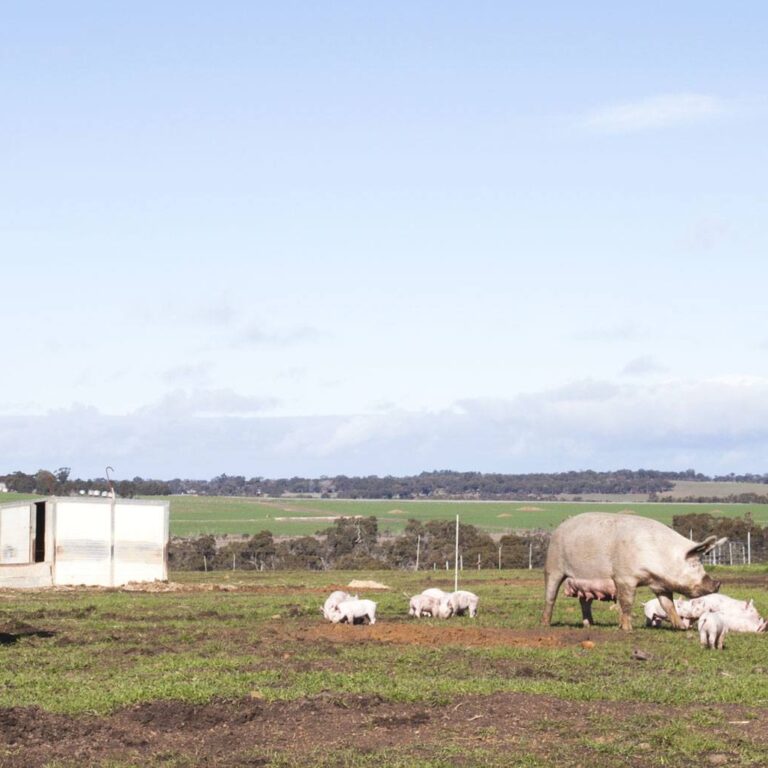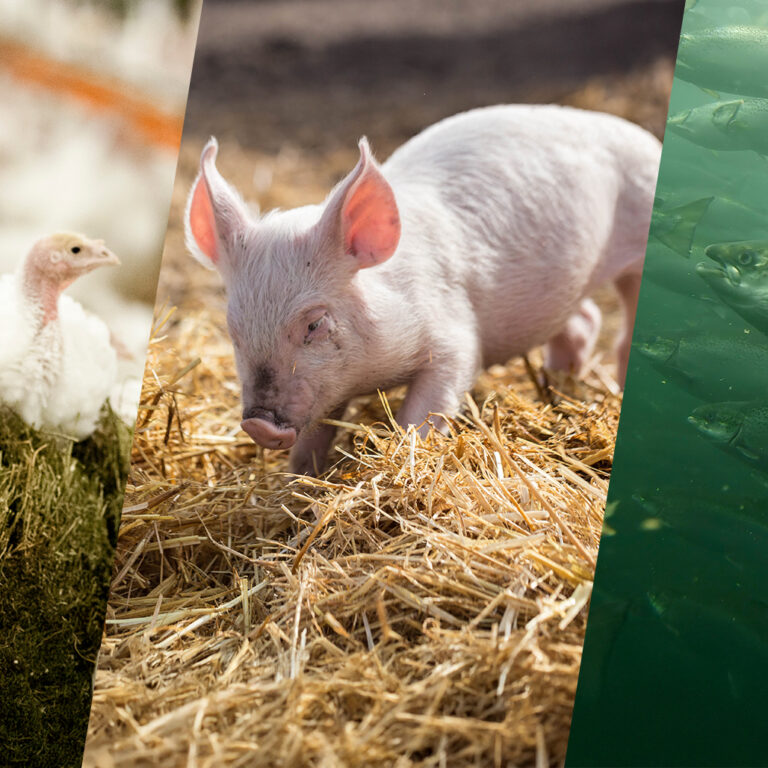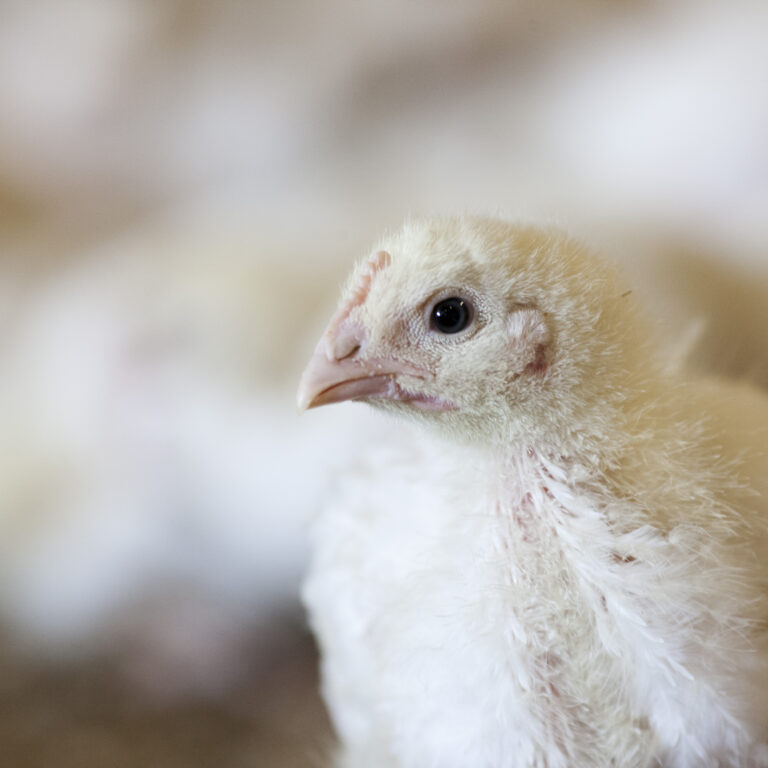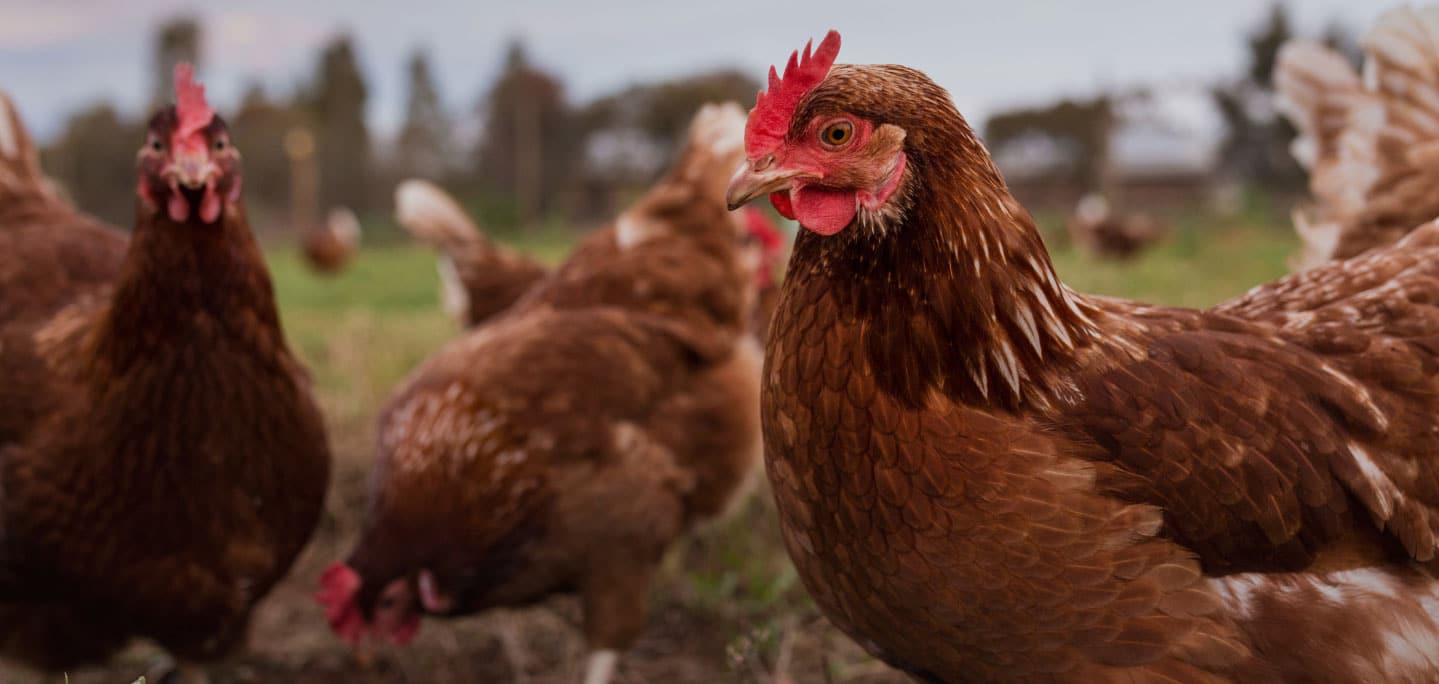For many of us life has changed significantly over the past year, and the concept of putting a face to a name, or even attending a face-to-face meeting, suddenly feels a little strange.
So, this got us thinking that there’s no better time for us to introduce ourselves to our readers, and share a bit more about what happens behind the scenes at the RSPCA Approved Farming Scheme.
The RSPCA Approved Farming Scheme was developed to drive better welfare standards on farm and at slaughter for Australia’s most intensively farmed animals. Nearly 25 years later, we are proud that the Scheme is Australia’s leading independent certification scheme focused on animal welfare.
It begins with detailed standards
As an evidence-based organisation, the RSPCA believes in the science that says we can improve the lives of animals by ensuring they are farmed in an environment that caters for their needs and encourages natural behaviours.
The RSPCA’s Senior Scientific Officer (Farm Animals), Melina has been developing animal welfare standards for over a decade.
“RSPCA Australia’s Science team develop the standards which are informed by animal welfare science, RSPCA policy, leading farming practices in Australia and overseas, and commercial realities. We seek input from livestock industries and producers to understand the feasibility of implementing new requirements and work hard to find the right balance between improving welfare and being commercially viable in Australia today,
“Having a Scheme that no one can join will do nothing for animal welfare. In saying that, what sets the RSPCA Approved Farming Scheme apart from conventional systems is that continuous improvement in animal welfare is central to all our standards.” says Melina
With the Scheme’s mission being to improve the lives of as many farm animals as possible, providing better welfare, and maintaining uptake can be a challenge.
“It’s good to see uptake of our standards, particularly within the chicken meat industry over the past 8 years. Seeing where the meat chicken industry has come from to where they are now is really positive. Their uptake of the standards has had a significant impact on animal welfare. Of course, there’s always room for improvement and, with each regular review of a Standard, there’s an opportunity to do just that. It’s about incremental change.”
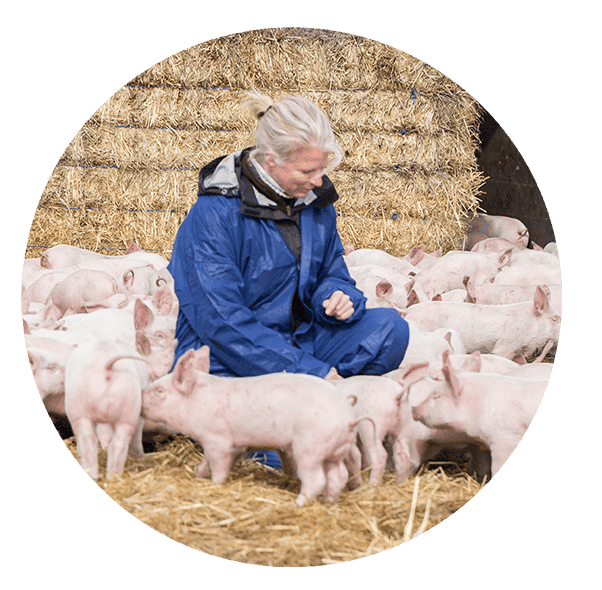
Scientific Officer (Farm Animals) Dr Sarah joined RSPCA Australia’s Science team over a year ago, previously working as a Department of Agriculture On-plant Veterinarian. With her current role focusing on poultry and pigs she’s always reviewing the science to see the latest developments in animal welfare.
“There’s a lot of exciting new research coming out, and with these new findings there is the opportunity to work with industry to see them become practice – leading to better animal welfare for millions of animals.”
Engaging with forward thinking business and industry
Engagement with the Australian food industry and encouraging the implementation of higher welfare farming standards is no mean feat. A task that requires broad stakeholder management, and a keen sense for identifying opportunities that improve animal welfare along the supply chain.
Humane Food Manager Hope has been at RSPCA Australia for 13 years. Through her role, Hope has worked with both big and small businesses to improve outcomes for farm animals through their supply chains. This can start with a conversation about moving to cage-free eggs, but then develop into commitments across multiple animal products, with a brand eventually sourcing from farms with RSPCA Approved certification.
“The RSPCA Approved Farming Scheme has been running for over 24 years, but it’s the last decade that we’ve seen a noticeable shift in big brands identifying farm animal welfare as part of their CSR commitments. By working collaboratively with industry over the past decade we’ve seen some great wins for animals, and we’re looking forward to continuing this journey with Australian businesses who are passionate about doing things better.” Says Hope.
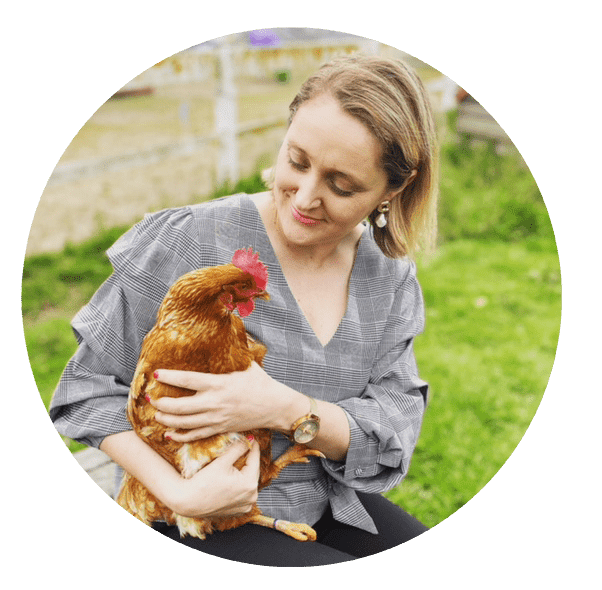
Assessments is the core of the Scheme
Assessment of farms against the standards is a critical aspect of the RSPCA Approved Farming Scheme.
RSPCA Australia employs specialised animal welfare Assessors to assess farms against the RSPCA’s animal welfare standards, which go beyond what is required by law. This program is entirely independent of the state/territory RSPCA Inspectors, whose role it is to enforce existing animal protection legislation on behalf of the state/territory government.
Farms with certification from RSPCA Approved are visited by an RSPCA Assessor 2–4 times a year, with additional unscheduled visits. As part of a typical assessment, an RSPCA Assessor will observe all areas where animals are kept as part of the Scheme and check the RSPCA’s standards are being met.
John, a former free-range chicken farmer has been an Assessor with the scheme for 6 years.
“I was given a copy of the RSPCA Approved Farming Scheme Standards, and I could see the vast improvements the standards would create. I just had to be a part of it.”
In 2019 alone 1,076 assessments were conducted on 483 farms by the RSPCA’s team of Assessors.
“I think the public deserve to know what they eat or what they buy in the supermarket has been farmed in a good environment and I can vouch for it,” says John.
Having a program of robust, regular on farm assessments is something the RSPCA is very proud of. The Assessors’ role is key to ensuring conformance with the standards and giving consumers confidence in picking up a product with the RSPCA Approved logo.

Assessments are the first step in certification
The Scheme’s certification process includes an on-site assessment by an RSPCA Assessor, followed by evaluation and review of their report by the RSPCA Certification team. The Certification team provide an additional layer of oversight to make sure the RSPCA’s standards are being met.
Certification and Assessment Coordinator Nikki says “Ensuring impartiality and correct interpretation of the standards is an important aspect of our further review process and adds to the robustness of the Scheme.”
The Certification team will communicate the assessment outcome with the farm. If an issue is identified or standard isn’t being met, a process is then put in place to correct it. If the issue is a major concern for animal welfare then immediate action is taken and animals can’t be marketed as RSPCA Approved. The RSPCA takes animal welfare on RSPCA Approved farms very seriously.
“We are first point of contact for producers who are part of the Scheme and spend a lot of time liaising with livestock people on the ground, along with our assessors to make sure standards are being met,” says Nikki.
The RSPCA’s Certification team also look after the scheduling of assessments, equipment management and data collection between assessments. “I’m proud every time I see the logo on products, as I know the depth of work behind that logo.”
Running the certification body
With Assessors across the country conducting assessments nearly every day of the year, there’s a lot of communication happening between Assessors and the Certification team. Manager of the RSPCA Certification Body, Dr Rick has worked with the Scheme for several years.
“I’ve had the pleasure of working closely with our Assessors for 8 years now, and I’m proud of their efforts in seeing the RSPCA’s standards implemented. More recently I’ve become responsible for managing the entire certification process and work with our team of Certification Coordinators who have the same dedication to the Scheme.”
Coming to the RSPCA with a background in aquaculture, Rick was instrumental in implementing the RSPCA’s farmed Atlantic salmon standard which has now seen over 6 million salmon raised to higher welfare standards.
“Seeing animal welfare recognised as an important part of future aquaculture production is really exciting, especially when this industry is set to be one of the fastest growing animal protein production sectors in the world,” says Rick.
Keeping the Scheme in line with world leading standards
When a certification scheme has been running as long as ours, it’s imperative to continually improve the management and processes of what’s happening behind the scenes. Since the Scheme began, the RSPCA has engaged two external parties to advise on our operations to see how we can continue to improve. Since the most recent review in 2018, our team have been working through the recommendations to ensure that our certification processes meet world leading standards.
Development Officer Cameron says “We continue to focus on the improvement of our processes. In the past 2 years we’ve worked hard to enhance our policies and procedures. Meaning that everything we do is accountable and aligned with best practice.”
To make sure we follow the correct procedures the Scheme has commenced internal audits.
“It’s my role to formally audit our certification processes to enable continuous improvement of our policies and procedures. Giving us another layer of assurance,” says Policy Officer, Kristy.
Telling the Scheme’s stories
A key part of the RSPCA Approved Farming Scheme is making sure Australians know why farming to higher welfare standards is important, and how they can support better animal welfare on farm by choosing a product with the RSPCA Approved logo.
The marketing and communications of the Scheme forms part of RSPCA Australia’s work to educate, engage, and inspire Australians who include meat and products from animals in their diet, to make better choices that ultimately raise the bar for farm animals. The Humane Food team work closely with brands participating in the Scheme to and continually look for ways to tell their animal welfare story.
Senior Humane Food Marketing & Communications Officer, Jessica says “Though I have been a part of RSPCA’s Humane Food work for 8 years I still get a kick out of a new brand joining the Scheme and publicly talking to their customers about animal welfare.”
Humane Food Marketing Officer, Talulah says “Brands that source from RSPCA Approved farms are showing that it is possible to have a successful and profitable business based on good procurement principles.”
“I know that there are others like me, who care deeply about animals and want to know the meat, fish and eggs they buy have come from farms that care about animal welfare. That’s why I’d like Australians to know that there’s a really easy way to do this. By looking for the RSPCA Approved logo, you know that animal welfare standards have been met.” says Talulah.
RSPCA Approved is just one part of our work
RSPCA Australia believes that good animal welfare must be an inherent part of farm animal production. The science tells us that good animal welfare must mean providing animals with good nutrition, a suitable environment, good health, the ability to express innate behaviours, and the opportunity to experience positive affective states.
The RSPCA Approved Farming Scheme is just one part of the RSPCA’s efforts to drive improvements to the conditions and standards for farm animals. RSPCA Australia is committed to improving farm animal welfare and recognises that to do this we need a range of targeted activities, of which having reputable animal welfare certification forms one part.
RSPCA Australia CEO, Richard says “Only by working collaboratively can we see real change for farm animals, today. I’m proud of the team for their dedication that is seeing a marked improvement in how animals are farmed in Australia. Thanks also to the farmers and brands working with us to achieve this and of course everyday Australians. Every time you chose RSPCA Approved you are saying that you care about farm animal welfare too and together this is making a big difference to the lives of millions of animals”

In response to the ongoing COVID-19 pandemic, the RSPCA has had to make some necessary changes to our operations to minimise the possible risk to our staff as well as our fellow Australians. See our COVID-19 update for more information.
Want more? Billions of reasons to celebrate world farm animals day or How to shop this decade

